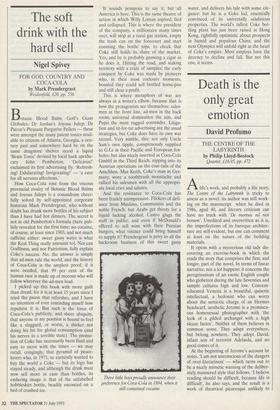The soft drink with the hard sell
Nigel Spivey
FOR GOD, COUNTRY AND COCA-COLA by Mark Prendergrast Weidenfeld, £20, pp. 556 Botanic Blood Balm; Goff's Giant Globules; Dr Jordan's Joyous Julep; Dr Pierce's Pleasant Purgative Pellets — these were amongst the many patent tonics avail- able to citizens of Atlanta, Georgia, a cen- tury past and somewhere hard by on the same drugstore shelves stood a liquid `Brain Tonic' devised by local hack apothe- cary John Pemberton. 'Delicious!' exclaimed its first advertising fly. 'Refresh- ing! Exhilarating! Invigorating!' — 'a cure for all nervous affections.'
How Coca-Cola rose from the viscous provincial rivalry of Botanic Blood Balms and Joyous Juleps is a conundrum cheer- fully solved by self-appointed corporate historian Mark Prendergrast, who without doubt has drunk more bottles of his subject than I have had hot dinners. The secret is not in old Pemberton's formula (here pub- licly revealed for the first time: no cocaine, of course, at least since 1903, and not much caffeine either: sweet gassy water is what the Real Thing really amounts to). Nor can Godliness, and nor Patriotism, fully explain Coke's success. No: the answer is simply that ad-men rule the world, and the history of Coca-Cola is the amplest proof, if it were needed, that 99 per cent of the human race is made up of morons who will follow wherever the ad-men lead.
I picked up this book with more guilt than dread, for it is at least 15 years since I tried the pause that refreshes, and I have no intention of ever reminding myself how repulsive it is. But such is the force of Coca-Cola's publicity, and sheer ubiquity, that anyone in my position is bound to feel like a sluggard, or worse, a shirker not doing his bit for global consumption (and his nerves in a terrible state). The promo- tion of Coke has necessarily been fluid and easy to move with the times — we may recall, cringingly, that pyramid of peace- lovers who, in 1971, so earnestly wanted to buy the world a Coke — but its logo has stayed steady, and although the drink must now sell more in cans than bottles, its enduring image is that of the unlabelled hobbleskirt bottle, beadily esconced on a bed of crushed ice.
It sounds pompous to say it, but all America is here. This is the same theatre of action in which Willy Loman aspired, lied and collapsed. This is where the president of the company, a millionaire many times over, will stop at a rural gas station, empty the trash can on the forecourt and start counting the bottle tops, to check that Coke still holds its share of the market. Yes, and he is probably gnawing a cigar as he does it. Hitting the road, and staking territory with a crate of samples: the early conquest by Coke was made by pioneers who, in their most cocksure moments, boasted they could sell bottled horse-piss and still clear a profit.
This is where metaphors of war are always at a writer's elbow, because that is how the protagonists see themselves: sales- men at the front line, ad-men in the back room; universal domination the aim, and Pepsi the most rugged contender. Litiga- tion and tit-for-tat advertising are the usual strategies, but Coke does have its own war record. Very nimble, this: not only Uncle Sam's own tipple, conspicuously supplied to G.I.s in their Pacific and European fox- holes; but also nicely inserted as Coca-Cola GmbH in the Third Reich, nipping into its Austrian operations on the coat-tails of the Anschluss. Max Keith, Coke's man in Ger- many, wore a toothbrush moustache and rallied his salesmen with all the appropri- ate local cries and salutes.
And the resistance to Coca-Cola has been frankly unimpressive. Flickers of defi- ance from Muslims, Communists and the noble French: but Arabs get thirsty for a liquid lacking alcohol; Castro glugs the stuff in public; and even if McDonald's offered to sell wine with their Parisian burgers, what vintner could bring himself to supply it? Prendergrast is privy to all the backroom business of this sweet gassy Three little boys proudly announce their preference for Coca-Cola in 1894, when it still contained cocaine water, and delivers his tale with some ele- gance: but he is a Coke kid, essentially convinced of its universally salubrious properties. The world's tallest Coke bot- tling plant has just been raised in Hong Kong, rightfully optimistic about prospects in humid and populous China; and the next Olympics will unfold right at the heart of Coke's empire. Most empires have the decency to decline and fall. But not this one, it seems.


















































 Previous page
Previous page